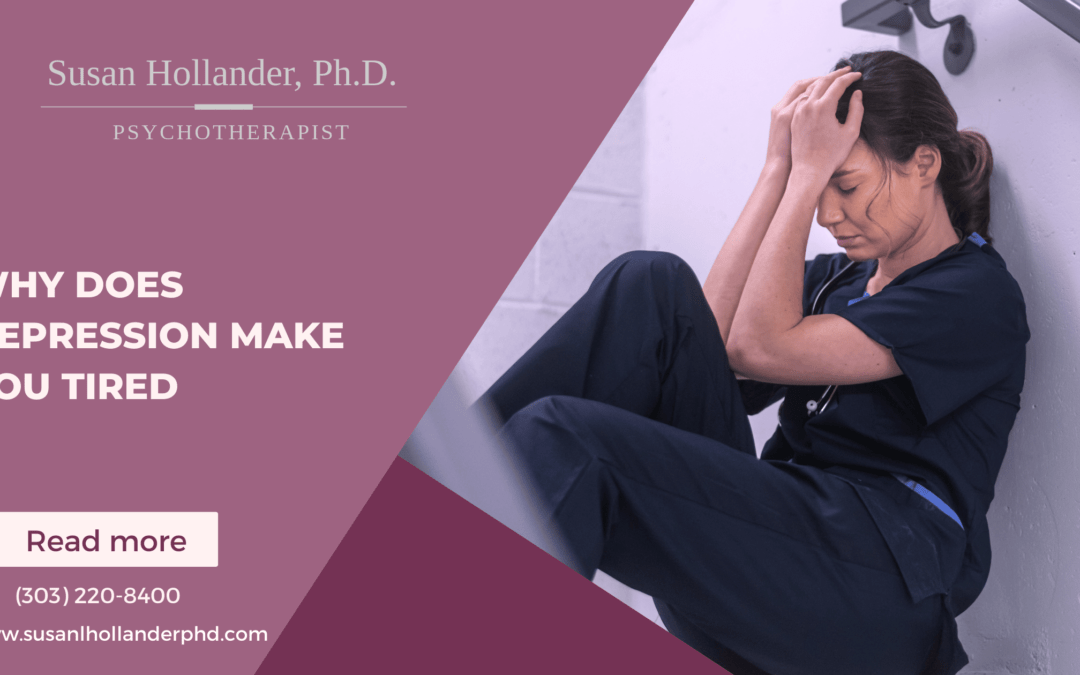Clinical depression is a widespread mental health disorder that affects millions of people worldwide. It presents with a range of symptoms, including persistent sadness, loss of interest in daily activities, and difficulty concentrating. Among these, one of the most common yet often overlooked symptoms is fatigue—a deep, unrelenting tiredness that does not improve with rest. Fatigue is a significant challenge for those struggling with clinical depression. According to the National Institute of Mental Health (NIMH), nearly 90% of individuals with major depressive disorder experience fatigue as part of their symptoms. This exhaustion goes beyond feeling physically tired; it affects motivation, productivity, and overall well-being. Understanding the connection between depression and fatigue is essential, as it impacts daily life and mental health recovery. Recognizing this link allows individuals and healthcare providers to develop strategies for managing energy levels, improving functioning, and enhancing quality of life.
Understanding Depressive Disorder and Fatigue
Depression is a serious mental health condition characterized by persistent feelings of sadness, hopelessness, and a lack of interest or pleasure in daily activities. It affects how a person thinks, feels, and behaves, leading to various emotional and physical problems. Depression presents with a range of symptoms that can vary in intensity. Common symptoms include:
- Persistent low mood or sadness
- Loss of interest in activities once enjoyed
- Changes in appetite or weight
- Difficulty sleeping or excessive sleeping
- Feelings of worthlessness or guilt
- Difficulty concentrating or making decisions
- Thoughts of death or suicide
Fatigue is a particularly common symptom, often overshadowing other aspects of depression. Unlike normal tiredness, depression-related fatigue doesn’t improve with rest and can make even simple tasks feel overwhelming. This persistent exhaustion contributes significantly to the reduced quality of life in those with depression.
Statistics on the Prevalence of Fatigue in Individuals with Depression
Fatigue is highly prevalent among individuals with depression. Research indicates that approximately 90% of people diagnosed with major depressive disorder report experiencing significant fatigue. This statistic highlights the importance of addressing fatigue as a core symptom of depression. (Source: National Institute of Mental Health – NIMH)
How Depression Causes Fatigue
Disruption of Sleep Patterns
Depression often leads to significant disruptions in sleep patterns. Insomnia, characterized by difficulty falling or staying asleep, and hypersomnia, marked by excessive sleeping, are both common among those with depression. These sleep disturbances result from the emotional and physiological effects of depression, making it challenging for individuals to achieve restorative sleep. Poor sleep quality directly impacts daytime energy levels. Insomnia leads to insufficient rest, causing daytime fatigue and difficulty concentrating. Hypersomnia, despite involving more sleep, often results in poor sleep quality, leaving individuals feeling lethargic and unrefreshed upon waking. Both conditions contribute to the overwhelming tiredness frequently associated with depression.
Changes in Brain Chemistry
Neurotransmitters like serotonin and dopamine play crucial roles in regulating mood, energy, and motivation. Serotonin helps stabilize mood and promotes a sense of well-being, while dopamine is essential for motivation, reward, and energy levels. Depression often involves an imbalance in these neurotransmitters. Low levels of serotonin can lead to feelings of sadness and low energy, while a deficiency in dopamine reduces motivation and physical energy, contributing to the persistent fatigue seen in depressed individuals. This chemical imbalance creates a state of constant exhaustion, even in the absence of physical exertion.
Physical Symptoms and Mental Exhaustion
Depression can lead to profound physical and mental exhaustion. Physically, the body’s energy reserves and overall physical health become depleted due to the ongoing stress and lack of restful sleep. Mentally, depression drains cognitive resources, making it difficult to focus, think clearly, or engage in daily activities. This dual exhaustion compounds the fatigue experienced by those with depression. Chronic stress, often a component of depression, triggers a continuous state of heightened arousal in the body, which can be mentally and physically draining. The constant release of stress hormones like cortisol eventually leads to adrenal fatigue, further worsening the overall sense of tiredness and contributing to the cycle of exhaustion.
The Vicious Cycle of Depression and Fatigue
How Fatigue Worsens Depression
Chronic fatigue can significantly worsen the symptoms of depression by creating a sense of physical and mental heaviness that makes daily life feel overwhelming. This persistent exhaustion often leads to increased feelings of hopelessness, irritability, and frustration, further deepening the depressive state. When fatigue is present, individuals may struggle to engage in activities that could alleviate depressive symptoms, such as socializing or pursuing hobbies, which in turn can amplify feelings of isolation and sadness. Fatigue dramatically reduces motivation, making even basic tasks like getting out of bed or maintaining personal hygiene feel insurmountable. A study published in the Journal of Affective Disorders found that up to 97% of individuals with major depressive disorder reported a significant loss of energy or fatigue, and this symptom was closely linked to impaired daily functioning (Source: Journal of Affective Disorders, 2018). The lack of motivation and energy perpetuates a cycle where the individual avoids activities that could potentially improve their mood, such as exercise, social interaction, or productive work, further reinforcing depressive symptoms.
The Role of Inactivity in Maintaining Fatigue
Depression often leads to reduced physical activity, which can perpetuate feelings of tiredness. The lack of movement contributes to physical deconditioning, where the body becomes less efficient at generating and sustaining energy. This inactivity also leads to poor circulation, muscle weakness, and stiffness, all of which can make fatigue worse. A study from the American Journal of Psychiatry reported that individuals with depression are 50% more likely to be physically inactive compared to those without depression (Source: American Journal of Psychiatry, 2013). Engaging in regular physical activity is crucial for managing energy levels in individuals with depression. Exercise has been shown to boost the production of endorphins, which are natural mood lifters, and improve overall energy levels. According to a study published in Psychosomatic Medicine, regular physical activity can reduce symptoms of fatigue by up to 20% and improve mood, making it an essential component of depression management (Source: Psychosomatic Medicine, 2008). Even light activities, such as walking or stretching, can help break the cycle of inactivity and fatigue, gradually restoring physical energy and mental clarity.
Coping Strategies for Depression-Related Fatigue
Improving Sleep Hygiene to Combat Poor Sleep
Establishing a regular sleep routine, sometimes called sleep hygiene, can significantly improve sleep quality, which is often disrupted by depression. Aim to go to bed and wake up at the same time every day, including weekends. This consistency helps regulate the body’s internal clock. Avoid screens (TV, smartphones) at least an hour before bedtime, as the blue light emitted can interfere with the production of melatonin, the hormone responsible for sleep. Engaging in calming activities like reading or listening to soft music before bed can also signal to your body that it’s time to sleep. Creating a sleep-friendly environment is crucial for improving sleep quality. Ensure your bedroom is dark, quiet, and cool—ideally around 60-67°F, as cooler temperatures are associated with better sleep. Use blackout curtains to block out light and consider using earplugs or a white noise machine to drown out disruptive noises. A comfortable mattress and pillows that support your preferred sleeping position can also make a significant difference. According to a study published in Sleep Medicine Reviews, improving sleep hygiene can lead to a 30% improvement in sleep quality among individuals with depression (Source: Sleep Medicine Reviews, 2015).
Managing Stress and Anxiety
Reducing stress is essential for alleviating fatigue, especially in those with depression. Techniques such as deep breathing exercises, progressive muscle relaxation, and guided imagery can help calm the mind and reduce the physiological effects of stress. Time management strategies, such as breaking tasks into smaller, manageable steps and prioritizing activities, can also reduce overwhelming feelings and help prevent stress from accumulating. Mindfulness practices, including meditation and yoga, have been shown to reduce symptoms of depression and fatigue by promoting relaxation and improving emotional regulation. A study published in JAMA Internal Medicine found that mindfulness meditation can reduce symptoms of anxiety and depression by 20% or more, contributing to better mental and physical well-being (Source: JAMA Internal Medicine, 2014). Relaxation exercises can help lower cortisol levels, the hormone associated with stress, which can decrease fatigue. Physical Activity and Nutrition Regular physical activity is one of the most effective ways to combat fatigue and improve mood in individuals with depression. Exercise increases the production of endorphins and other neurotransmitters that enhance mood and energy levels. Even moderate exercise, such as walking for 30 minutes a day, can significantly reduce feelings of fatigue and improve overall mood. According to a study published in The Cochrane Database of Systematic Reviews, exercise reduces symptoms of depression and fatigue by about 30%, making it a vital component of treatment (Source: The Cochrane Database of Systematic Reviews, 2013). Balanced nutrition is crucial for maintaining energy levels and overall health. Diets rich in whole grains, lean proteins, fruits, and vegetables provide the essential nutrients the body needs to function optimally. Omega-3 fatty acids, found in fish like salmon and walnuts, have been shown to improve mood and reduce symptoms of depression. Additionally, staying hydrated by drinking plenty of water throughout the day is essential, as even mild dehydration can exacerbate feelings of fatigue. A study published in The American Journal of Clinical Nutrition found that individuals who consumed a balanced diet reported 20% higher energy levels than those with a diet high in processed foods (Source: The American Journal of Clinical Nutrition, 2016).
Seeking Professional Help and Antidepressant Medication
If fatigue persists despite efforts to improve sleep, reduce stress, exercise, and eat well, it is crucial to consult a healthcare provider. Persistent fatigue could be a sign of untreated or inadequately treated depression, or it might indicate another underlying condition, such as anemia, thyroid issues, or chronic fatigue syndrome, that requires medical attention. Treatment options for depression-related fatigue often include a combination of therapy and medication. Cognitive-behavioral therapy (CBT) is one of the most effective forms of therapy for depression, helping individuals change negative thought patterns and behaviors that contribute to fatigue. Medications, such as selective serotonin reuptake inhibitors (SSRIs) and other antidepressant medications, can help correct neurotransmitter imbalances that contribute to both depression and fatigue. It is important to consult a healthcare provider to evaluate whether your current antidepressant medication is contributing to feelings of fatigue and to discuss potential alternatives if necessary. A study published in The Lancet Psychiatry found that combining therapy with medication can improve outcomes by up to 40% compared to either treatment alone (Source: The Lancet Psychiatry, 2018). Taking the first step to address depression-related fatigue is a courageous decision. If your fatigue and other symptoms are becoming too difficult to manage independently, it’s crucial to seek support. Reaching out to a professional like Dr. Susan Hollander could be the beginning of your journey toward recovery and improved well-being. You don’t have to face this challenge alone. Expert guidance and therapy have made a significant difference for many who have struggled with similar issues, providing them with the tools they need to regain control of their mental health.
Conclusion
Depression and fatigue are closely connected, with each often exacerbating the other in a challenging cycle. Depression can lead to persistent tiredness, affecting every aspect of daily life, from motivation to overall well-being. Recognizing this link is essential for understanding the full impact of depression and addressing it effectively. If you find yourself experiencing persistent fatigue alongside depressive symptoms, it’s important to seek professional help. This step can be crucial in breaking the cycle of depression and exhaustion, allowing you to regain energy and improve your quality of life. Managing energy levels while dealing with depression involves a comprehensive approach, including better sleep hygiene, stress management, regular physical activity, and proper nutrition. With the right strategies and support, managing fatigue and taking meaningful steps toward recovery and mental wellness is possible.
Why does depression cause extreme fatigue?
Depression causes extreme fatigue due to a combination of disrupted sleep patterns, changes in brain chemistry, and the overwhelming emotional and physical exhaustion that accompanies the condition. Insomnia or hypersomnia, common in depression, results in poor-quality sleep, which directly impacts energy levels during the day. Additionally, depression affects neurotransmitters like serotonin and dopamine, which play key roles in regulating mood and energy. This imbalance, along with the chronic stress and mental strain associated with depression, leads to persistent tiredness and a profound lack of motivation, making even simple tasks feel exhausting.
Can fatigue be the only symptom of depression?
While fatigue is a common and significant symptom of depression, it is rarely the only symptom. Depression typically presents with a range of symptoms, including persistent sadness, loss of interest in activities, changes in appetite or weight, difficulty concentrating, and feelings of hopelessness or guilt. However, in some cases, fatigue may be one of the most prominent symptoms, overshadowing others. Suppose fatigue is severe and persistent, especially if it is accompanied by low mood or other subtle signs. In that case, it is important to consider the possibility of depression and seek a professional evaluation.
How long does fatigue from depression last?
The duration of fatigue from depression varies depending on several factors, including the severity of the depression, the effectiveness of treatment, and individual circumstances. Fatigue can persist as long as the depression remains untreated or poorly managed. With appropriate treatment, such as therapy, medication, and lifestyle changes, fatigue may begin to improve within a few weeks to a few months. However, for some individuals, it may take longer to fully regain energy levels. Consistent treatment and ongoing support are key to reducing fatigue and managing its impact on daily life.
Can improving sleep help reduce depression-related fatigue?
Yes, improving sleep can significantly reduce depression-related fatigue. Sleep disruptions are common in depression, with many individuals experiencing insomnia or excessive sleeping, both of which contribute to persistent tiredness. By establishing a regular sleep routine, creating a conducive sleep environment, and addressing any underlying sleep disorders, individuals can enhance the quality of their sleep. Better sleep quality helps restore energy levels, improves mood, and reduces the overall impact of fatigue, making it a crucial component in managing depression-related exhaustion.
What are some natural ways to fight fatigue caused by depression?
To naturally fight fatigue caused by depression, try these strategies:
- Exercise: Regular physical activity, like walking, can boost energy and improve mood.
- Balanced Diet: Eat a nutritious diet rich in whole foods and stay hydrated.
- Sleep Hygiene: Maintain a consistent sleep schedule and create a restful sleep environment.
- Stress Management: Practice mindfulness, deep breathing, or yoga to reduce stress.
- Sunlight: Spend time outdoors in natural sunlight to improve mood and energy.
These approaches can help reduce fatigue and support overall well-being.







Recent Comments